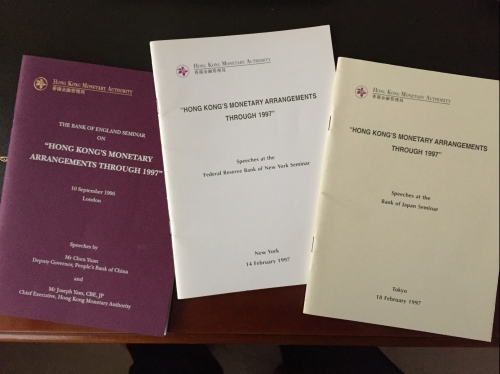The Status of Hong Kong as an International Financial Centre
Many cities in many jurisdictions aspire to be an international financial centre. In the many policy statements by the relevant authorities articulating this aspiration, I notice little reference to what exactly they meant by an international financial centre and what roles they contemplate to perform. Perhaps these issues are so basic that they are taken for granted. I disagree. All public policies must have clear objectives that the public can readily understand and be made on the basis of a sound theoretical foundation. In the absence of these, very simply the public interest may not be well served, in that valuable efforts and resources may be wasted, and public support may be less forthcoming than would otherwise be the case.
In other Viewpoint articles, I have defined “finance” as the mobilization of money from those who have it to those in need of it, and argued that if such mobilization is effectively organized the economy will be well served. A “financial centre” is obviously a place where such mobilization is organized. And an “international financial centre” is where the mobilization money is conducted on an international dimension, involving money of foreign entities (institutions and individuals), whether they are investing it or raising it. Thus, a company from the Mainland raising money in Hong Kong through the issue of shares traded in the stock market of Hong Kong, attracting money from investors from all over the world, is a typical example of such activity. And if this and other types of activities mobilizing money from those who have it to those in need of it on an international dimension are conducted on a large scale here in Hong Kong, then obviously we qualify to be called an international financial centre.
I used the volume of Initial Public Offerings (IPO) of stocks, rather than trading activity measured in terms of the daily turnover in our stock market, for illustration deliberately. The stock market is (merely) a secondary market that provides liquidity and facilitates accurate price discovery of the stocks listed. Indeed, these are the two conditions that enhance the attractiveness of the stock market as a channel for mobilizing money through IPO activities. But no more than that; even though there are many interests involved in the daily trading activities, including those of stock brokers, traders and the much larger population of investors holding stocks. This is why, in that context, it is called a secondary market and not a primary market; it is only of secondary importance compared with the primary IPO market, which is where money is mobilized to serve the economy. With the volume of IPO offerings in Hong Kong amongst the largest in the world, sometimes surpassing New York and London to be the largest, without doubt we are an international financial centre.
In my opinion, Hong Kong can even claim to be the most international of financial centres in the world, in that the two “legs” in the mobilization of money – investors and fund raisers – are predominantly foreign, for example, fund raisers from the Mainland tapping money from Europe and America. By comparison, if we take New York as an example: yes there is a huge volume of money being mobilized there, but if one looks at the matter carefully, one finds that either one of the two legs is predominantly domestic, in that foreign companies list their shares in New York to attract money from US investors and foreign investors go to New York to invest in financial assets issued by US entities. New York is important as an international finance centre because its home economy – the US – is the largest in the world, with huge amounts of US money wishing to invest overseas and a large number of US entities wishing to raise money from overseas. For Hong Kong, we are merely a city of seven million people and a small economy, and yet we are playing such an important role in international finance. But obviously we should not be complacent and, in any case, rankings of this nature are never quite meaningful enough to brag about. I mention it to sharpen our focus on what are the roles of an international financial centre.
It is particularly important for Hong Kong to be focused. Article 109 of the Basic Law says that: “The Government of the Special Administrative Region shall provide an appropriate economic and legal environment for the maintenance of the status of Hong Kong as an international financial centre”. I am sure that this is a heavy responsibility that the HKSARG takes seriously. Indeed, it does; and the results speak for themselves. But international finance is in a state of flux. Many economies are still nursing from the wounds inflicted by the 2007-08 crisis. The developed markets are still talking about the normalization of monetary policy. The process of shrinking the balance sheet of the central bank and the withdrawal of the huge volume of liquidity injected through quantitative easing are only starting in the US; in Europe these are just talks for the time being; in Japan talks have not even started. Less liquidity and higher interest rates will have implications for the prices of financial assets that have been pushed to record levels by the excessive liquidity injected through quantitative easing. Meanwhile, investment banks, particularly those in Wall Street, are getting excited about the prospects of de-regulation and renewed market volatility induced by the normalization of monetary policy! There is also widespread geo-political tension that may well erupt into something ugly and destabilizing to international finance. It is a scenario that we have not experienced before. As an international financial centre, we need, more so than before, to be vigilant and focused.
In the work to maintain the status of Hong Kong as an international finance centre in accordance with Article 109 of the Basic Law, there is one strategic focus that we should always bear in mind and direct our efforts accordingly. Accepting my definition of an international financial centre, we should realistically be concentrating in the mobilization of money between the Mainland and the rest of the world, whether it is the mobilization of money from the rest of the world into the hands of Mainland fund raisers or the mobilization Mainland money into the hands of fund raisers in the rest of the world. Investors in the rest of the world are attracted by what Hong Kong can offer when they wish to invest in financial instruments issued by Mainland entities. They would not come to Hong Kong to look for financial assets issued, for example, by fund raisers in the US or Europe. Equally, the many entities around the world wanting to raise money would not come to Hong Kong unless they are interested in money originating from the Mainland (policy permitting). Our strategic focus should, therefore, be the mobilization of money between the two geographical or jurisdictional “legs”, namely, the Mainland and the rest of the world.
I can almost hear the criticism of some that Hong Kong, including our financial system, is quickly becoming “Mainlandized”, as if it is something evil. I must say frankly that, insofar as the financial system of Hong Kong is concerned, there is no meaningful international role to play if it is not because of the need to mobilize money between the Mainland and the rest of the world. This is an area of activity that we all should, in fact, welcome and be thankful instead. The financial activities supporting a small economy with seven million people simply do not justify a financial system of our size and do not make us an international financial centre. Our highly international financial system is itself a substantial part of the Hong Kong economy providing a lot of jobs and attractive incomes, supporting much domestic consumption and the livelihood of those employed in other sectors of the economy.
We have made considerable progress in the mobilization of money between the two “legs”. There are, of course, the now familiar Shanghai-Hong Kong Connect and Shenzhen-Hong Kong Connect for stock trading, which have I am sure raised the general interest of investors in the rest of the world in Mainland stocks and Mainland investors in stocks listed in Hong Kong. Hopefully, these will in time, and with the necessary (Mainland related) policy adjustments, lead to more entities in the two “legs” to organize listings in Hong Kong. There is also the Bond Connect which opens up the bond channel for the mobilization of money between the Mainland and the rest of the world through Hong Kong, particularly if in time two-ways flows are allowed. There are many other opportunities, as long as we stay focused in the role in the mobilization of money between the Mainland and the rest of the world. The current efforts in structuring a platform in Hong Kong for the mobilization of money from the Mainland and other economies to fund infrastructural projects along “One Belt, One Road” are right on. I wish them well, although I would not underestimate the difficulty in dealing with the politics of the project, given the many interests of the many jurisdictions involved. The hope is, of course, that the Mainland’s leadership and influence in all this, and its recognition of the role that Hong Kong can play (and play distinctly well), would help.
With capital controls still being implemented on the Mainland, such mobilization of money between the Mainland and the rest of the world will obviously involve specific policy decisions concerning the capital account by the financial authorities on the Mainland, specifically the People’s Bank of China. Outside of the Mainland, Hong Kong knows the capital account of the Mainland of China and the relevant policies best, and is also in the best position to offer advice on how international capital flows can be mobilized in the best interest of China. We are also in the best position to assist in the actual mobilization, through providing a safe and efficient financial platform that addresses both risks and opportunities. We need to remind the financial authorities on the Mainland of the utility of Hong Kong as the international financial centre of China and that using the financial services of Hong Kong is in the national interest. For the effective maintenance of monetary and financial stability, against the background of a rather confused state in international finance, the Mainland still needs some form of capital controls and for some time to come. My hope is that this will give us enough time to achieve such a critical mass as the international financial centre of China as to be indispensable, even if capital account openness is eventually achieved on the Mainland. But I don’t know much time we have. So let us stay focused.
Joseph Yam
17 August 2017
香港國際金融中心地位
有很多地方都希望成為國際金融中心。然而,有關政策聲明卻很少提及他們心目中國際金融中心的定義,或應該擔當的角色。也許,對他們來說,這是老生常談,毋須多說。但清楚說明還是非常重要的,因為所有公共政策必須具有清晰的目標,讓公眾可以了解,在紮實的理論基礎上付諸實行,否則就未必能全面符合大眾利益,虛耗人力資源,更難以獲得廣泛支持。
在過去的觀點文章中,我將「金融」定義為「資金融通」,即把資金從投資者分配到集資者手上,從而促進經濟發展的活動。一個「金融中心」,顧名思義,就是進行資金融通的地方;而一個「國際金融中心」,便是一個進行國際層面資金融通的地方,當中涉及非本地的機構或個人在當地進行投資或集資的活動。一家內地公司在香港進行首次公開招股集資,吸引香港及世界各地的投資者認購,便是一個典型例子。如果類似的國際層面資金融通活動大規模地在香港進行,我們絕對稱得上是一個國際金融中心。
我刻意用首次公開招股集資量,而非股票市場每日成交額來作為衡量國際金融中心的指標。這是因為股票市場是一個二手市場,主要功能是提供流動性和促進價格發現,目的是為首次公開招股集資活動創造有利的後續環境。當然,股票市場牽涉許多不同持份者的利益,包括股票經紀以及持有股票的投資者。但相比之下,從融通資金及服務經濟的角度看,其重要性不及首次公開招股集資市場,這也是其被稱為二手市場非一手市場的原因。隨著香港的首次公開招股集資量越來越大,經常超越紐約和倫敦,成為全球第一,無庸置疑香港是一個國際金融中心。
而且,我相信香港是全球最國際化的金融中心,因為投資者和集資者這兩個資金融通的組成部分都主要來自境外,例如內地的集資者會透過香港籌集來自外地如歐美的資金。相對地,如果以紐約為例子,雖然有大量的資金融通活動進行,不過其中一方是主要來自本土,即外國公司在紐約上市以吸引美國投資者,又或外國投資者於紐約投資美國公司的金融資產。由於美國是全球最大經濟體,國內有大量的資金希望於海外投資,加上美國公司希望吸收海外資金,因此造就紐約成為重要的國際金融中心。就香港而言,我們只是一個擁有700萬人口的小型經濟體,但卻在國際金融市場扮演舉足輕重的角色。不過,我們不應該滿足於此,亦不值得自吹自擂。我提出這點是拋磚引玉,希望大家聚焦國際金融中心的真正意義。
香港的情況很特殊。《基本法》第109條列明「香港特別行政區政府提供適當的經濟和法律環境,以保持香港的國際金融中心地位」,可說任重道遠。香港特區政府一直對此認真看待,從今日香港的國際金融中心地位便可反映出來。然而,國際金融市場不斷變化。經過2007至2008年環球金融海嘯一役,有很多經濟體仍在復甦當中。貨幣政策正常化,即縮表和加息,雖然在已發展市場中正在醞釀,但暫時只有美國進行,歐洲仍在討論階段,而日本則依然風聞不動。早前由量化寬鬆政策注入的資金,將金融資產價格推到紀錄新高,而收緊流動資金和推高利率會對金融資產價格造成影響。與此同時,投資銀行,特別是在華爾街的金融機構,對貨幣政策正常化引發的市場波動,和有機會出現的監管放寬暗地裏興奮不已。日益緊張的地緣政治壓力亦可能對國際金融的發展構成威脅。這將是我們未曾經歷過的情況,故此香港要維持並鞏固其國際金融中心地位,絲毫不能鬆懈。
按照《基本法》第109條,在保持香港作為國際金融中心地位的工作上,有一個策略性的部署應該緊記和落實執行,就是根據本文起首提到的國際金融中心定義,專注於在香港安排內地與外地之間的資金融通:不論是資金從外地流入內地的集資者手中;還是資金從內地流出到外地的集資者手中。基本上,外地的投資者與集資者之間的資金融通,是不需亦不會大規模地在香港進行的。內地投資者和集資者之間的資金融通亦然。
近年,我聽到有些意見,指香港金融體系正「內地化」,彷彿是一件壞事。也許,我的意見不中聽,但我亦希望指出,如果不是因為扮演內地與外地之間資金融通的橋樑角色,香港並無國際金融中心的地位可言,而一個700萬人口的小型經濟體本身的金融活動,亦不足以成為國際金融中心。無論如何,我們高度國際化的金融體系是構建香港經濟的重要部分,提供大量就業機會及可觀的收入,並支持本地消費及其他各行各業的生計。
香港在促進內地與外地之間資金融通的工作上一直有長足發展。當中,我相信大家耳熟能詳的「滬港通」和「深港通」,確實提高了世界各地投資者對內地股票,以及內地投資者對香港股票(希望能伸展到外地在香港發行的股票)的興趣。我希望相關當局的政策會與時並進,讓更多內地與外地之間的資金融通,能更全面通過新股上市活動在香港進行。最近開通的「債券通」,亦開拓了內地與外地間透過債券渠道的資金融通,將來如果可以雙向流動效益會更大。只要我們扮演好這個資金融通的角色,機會將會接踵而來。現時,香港正為內地與其他經濟體就着「一帶一路」進行的基建工程而構建融資平台,由於涉及不同經濟體的利益,當中因政治考慮而帶來的難度不容低估,相信內地在全力推進「一帶一路」項目發展時,會清楚知道香港可以扮演的獨特角色,令一切工作得以順利進行。
內地仍然實行資本管制,與外地的資金融通無可避免地會牽涉內地金融監管機構,特别是中國人民銀行對資本帳政策的決定。在內地以外,香港是最了解內地資本帳及相關政策的地方,並能就國際資金的流動如何最符合國家利益給予意見。香港亦是最好的試驗場,提供一個安全及有效率的金融平台,協助進行實際的資金融通,並妥善管理風險及發展機會。我們要讓內地金融監管機構知道,香港作為中國的國際金融中心的能力,及透過香港進行金融服務絕對符合國家利益。現時國際金融情況錯綜複雜,內地仍然需要一定程度的資本管制,以有效維持貨幣和金融穩定。有見及此,我認為內地並不會急於完全開放資本帳,希望香港可以把握時機,在內地金融完全開放前,取得一定的市場份額,成為國家不可或缺的國際金融中心。至於還有多少時間,實在無法估計,還是把握機會,全力向前邁進。
任志剛
2017年8月17日
Read Full Post »






